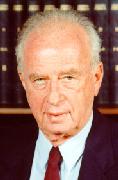

In a single moment, we learn how much easier it is to destroy than to build, and how deep are the reservoirs of hatred and suffering which make the pursuit of peace the most difficult of human aspirations. Many, if not all of us, are involved with learning, a similarly elusive goal when universally applied, and one that anchors its hope on distant achievement, perhaps along the way draining that part of the hateful waters which gather and are sustained by ignorance.
In a single act, we see an image that can remind us of our own struggles with our daily demons, as if the bullet that ended Yitzhak Rabin's struggle shattered his example into holographic shards around us. How many times in history has love of God led to persecution of man, woman and child? How many places do we see love of justice putrefy into justification for genocide? In our own lives, each day, we are faced with decisions about how to react to people who dare to differ from us in belief, practice or perception...sometimes the tension is so extreme, we recognize these people as mistaken, ignorant, inferior, all the way to inherently evil. All our lives serve as preparation for how we choose to react, as well as the choices we have available to us in these trying circumstances.
Our advanced communications systems bombard us with a lopsided scorecard, as we witness murders beyond number with numbing regularity, yet only annually anoint a handful as Nobel Peace laureates, only to see these, too gunned down. The gunners are dismissed as "crazy", "fanatic" or "deluded", yet they are the predictable product of a system that appears to be increasingly effective at separating us from each other, as well as "the better angels of our nature".
Here on the Internet, we are creating a place, where for the first time in human history we can come to know one another by the quality of our thought, and enriched by the exchange, return to the business at hand of making a difference in the "real world" where we live the "other" part of our lives. We do so without knowing many of the cues that would perhaps allow us to reflexively dismiss the thoughts of others on the basis of appearance, age, sex, culture, and this is much to our credit, and a strength of our community. However, in doing our work here, we too bump up against intransigence, controversy and a host of other reminders that IP doesn't mean In Paradise.
As Rabin discovered, like Ghandi, King, Kennedy and a host before (and lamentably, but most likely a host to come), pushing for peace has a newtonian tendency to elicit a reaction that resembles quintessential evil. Theologians may debate the existence of evil, but common experience indicates that either it exists, or it serves as shorthand for a complex host of phenomenon that taken together resemble what evil would look like if it did exist. Regardless of the outcome of the debate, it remains that evil must be invited in to our minds before it can take over our actions. Viruses abound, but you don't get sick until you become a host.
Remember this the next time your anger flares, and spills over from a natural reaction to a reflexive replacement of the person who "caused" the anger with a symbol for "those kind of people" who routinely do such misdeeds. The person who cuts me off in my car becomes "one of those jerks who never use their turn signals", which opens old wounds for infection...unchecked by reflection, it can lead to all kinds of "us" against "them" scenarios all the way from teachers' unions vs. school boards to Bosnia/Croatian/Serbian insanity.
Just because there is gravity doesn't mean we have to lay down and die. We can stand up to "human nature", becoming more human in the process. We can take the example of great spiritual teachers who light up the world, and also the example everyday unsung champions who light the lives of those with whom they share passage on this earthly voyage, by rededicating ourselves to increasing the capacity for observation, understanding and compassion in ourselves and those around us.
Each one of us, doing the humble work that falls to our lot, when taken together form the most formidable of forces, a rising tide of wisdom to withstand the inevitable tragedies along the way of our unfolding. May the prayers for the spirits of the peacemakers, past, present and yet to come, also guide our actions.
Ferdi
ferdi_serim@monet.prs.k12.nj.us (school)